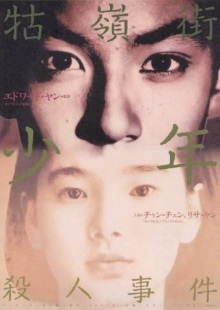
Our list of films to watch has grown so long that we can’t remember whether this one was added by my wife (because she remembers it being highly praised back when she was in high school) or myself (because it shows up often in lists of best films). Either way, this means that Edward Yang’s A Brighter Summer Day is a film that both of us really wanted to watch.
Perhaps the most amazing thing about this masterpiece is that it was made by a crew and a cast that were largely composed of amateurs. Apparently they were all trained by Yang himself as a drama teacher at Taiwan’s National Institute for the Arts. Given the resources available at the time, it must have been impossible to make this film otherwise. The cut that we watched, which I understand is the original, runs to just under four hours in length and involves a cast of nearly a hundred performers.
The lack of professionalism is evident both in the less than polished camera movement (where there is any, as in many other Taiwanese productions, the camera tends to be static most of the time) and the woodenness of the acting. Yet far from dragging down the film, these qualities actually elevate it. The passive camera gives the audience the impression that we are dispassionate witnesses to what is happening. The inexpertness of the cast makes us forget that they are acting at all. It’s pretty much the polar opposite of the exaggerated melodrama we’ve been watching in the early Hollywood movies. The end result is a naturalistic portrayal of life in Taiwan with a stunning degree of verisimilitude.
Set in the 1960s, the story ostensibly follows a young boy, played by Chang Chen in his debut role, as he navigates the travails of junior high school with its bullies, friends and a budding relationship with a girlfriend. But the plot is really just a framework around which to paint a detailed portrait of what the period was like. Foremost among the themes is the simmering conflict between the newcomers who arrived from Mainland China following the defeat of the Kuomintang and the native Taiwanese. The tensions between the families are reflected in their children who organize themselves into street gangs for self-protection and perhaps also to affirm their own sense of identity.
The film is therefore full of details that are both interesting and entertaining. Among the newcomers, the adults’ admiration of American industry and prosperity, not surprising considering how they owe their very survival to U.S. military support, is mirrored by their children’s fascination with American pop music. The film’s English title is itself a misheard line from Elvis Presley’s Are You Lonesome Tonight? Some of these details however are puzzling to non-Taiwanese. Chang Chen for example (most characters seem to be simply named after their performers) goes to night school, which helps explain why he gets involved with gangs, and my wife speculates that this may be due to his mediocre grades.
The film’s Chinese title pretty much tells you upfront that things turn out badly for Chang Chen. I actually find that I don’t much care for his personal story arc. I get that what happens in the end is the explosive culmination of all of the pressures that have been building up, but since the film maintains a respectful distance between the audience and what goes on inside the characters’ heads, it’s hard to understand why he does what he does. I will say that Ming makes for one of the most original and convincing femme fatales I’ve ever seen. I also appreciated how her own arc, emphasizing survival at all costs even if it means being willing to compromise and taking care not to offend anyone, serves as a contrast to the inflexible rectitude of Chang Chen’s father and through his teachings, Chang Chen himself.
We had to space this film out over a couple of nights since four hours is just too long to do in one sitting. But it’s worth noting that it doesn’t feel like a four-hour long film. There is so much going on and we get glimpses into the lives of so many interesting characters that there just isn’t room for boredom. There’s the charismatic and inappropriately named Honey who leads their gang. There the whole dynamic going on within Chang Chen’s family and how the siblings look out for each other. For example, we are stupefied at first when we see that he sleeps in a partition in a cupboard but then shocking realization arrives when the whole family sits down for dinner and we see how many people live in the house. For comedy value, there’s his pint-sized schoolmate with the high-pitched voice who gets roped into singing the female vocals in duets but would really prefer to sing Elvis Presley songs. One thing we never quite understood is the disparity in physical sizes among the students in the same class.
For all of these reasons, A Brighter Summer Day is a masterpiece in the truest sense of the word. It’s richly complex work that neatly shows off Yang’s keen insight into Taiwanese society while being a perfectly paced and deeply satisfying cinematic experience.
2 thoughts on “A Brighter Summer Day (1991)”